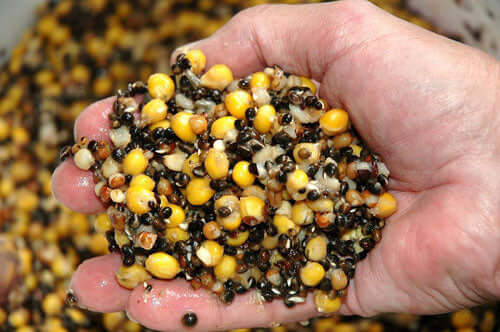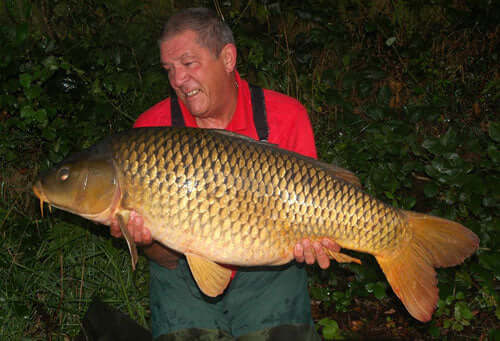A good angler never misses an opportunity to observe the water and the carp therein, as he knows he will not be successful if he spends most of his time camping and sleeping.

You are not going to spot those carp head and shouldering out in the bay if you are stuck in your sleeping bag with a book and a cup of coffee.
Success in carp fishing stems primarily from finding out as much as possible about the underwater environment and identifying areas where they might feed.

Passive watching if good, but up a tree with a pair of Polaroid glasses is the best way of not only spotting carp but of watching them feed and seeing how they react to bait, baiting situations and to rigs in particular.

I call areas like these dinner plates. These are areas of the lakebed that have been polished clean of silt and weed by the feeding activity of carp. Sometimes carp feeding in the same area day after day will cause these, but you can also create a dinner plate yourself, by regularly introducing plenty of bait in the same spot. In just a few days the carp will clear the bottom almost entirely of silt and weed. This is a typical dinner plate that I created on a river.

I first found a likely looking area on the inside of a long, slow bend where the current was virtually non-existent and overhanging trees provided the cover needed to give the fish confidence to move into shallower water close to the bank.

I baited the spot with plenty of mass baits namely hemp seed, popcorn maize and pigeon conditioner, and it did not take long for the carp to arrive.

Soon they were feeding so hard that the lakebed disappeared as the clouded up the water, and it wasn’t long before I had one in the net.

I created another very productive dinner plate in a promising quiet corner tucked away in a jungle of trees and overhanging bushes. The lake in question is quite large, being about 200 acres in size, but this little area looked remote and undisturbed.

The usual tactic on the lake is to fish at extreme range dropping baits by boat on features anything up to 250m out in the lake, but I felt sure that the fish would come in close, possibly after dark. I first picked a remote but interesting area of the lake and then began to bait up, using 10kg of groats and SuperRed groundbait a day. After only three nights this dinner plate was the result.
The fish clearly had no hesitation in venturing into the quiet and undisturbed area and it was obvious by their activity that they had thrown caution to the wind! The next evening I witnessed an astonishing sight. Carp were literally ripping up the lakebed in their feeding frenzy, so before dawn the following morning I went back with just a stalking rod and some more bait. Soon the trap was baited and as it got light I saw dark shapes ghosting into the baited spot. I waited until they had got their heads down and the water was beginning to colour and then lowered a bait down to the feeding carp. It was taken almost immediately by one of the largest fish in the lake weighing just over 44lb.

Invariably the fish are not at all shy of visiting a dinner plate. After all, it is the fish themselves that have created the feature by feeding there and provided you resist the temptation to fish it too soon or to heavily they will often come back time and time again. This dinner plate is in clear deep water and though it doesn’t look much in this photo it is actually the size of a car.

When you have created the feeding area and got them competing aggressively for every morsel of food, you can often extend the feeding area, and as the photo shows, a vast area of lakebed has been swept clean of all the silt and weed by the feeding activity of a large shoal of carp. Here a lone common can be seen searching for the last remnants of the bait.Unfortunately for that common he arrived at the dinner plate a bit late as I reckoned other fish had eaten all of the bait some time earlier. But clearly the fish was very agitated by the remaining smell of the bait and he appeared almost frustrated that there wasn’t anything left. I put a bait down onto the clear patch and the fish took almost immediately, and what a magnificent fish it was!
I love to watch carp go about their daily business. You can learn so much more about them when you are actually looking in on them in their home environment. You can see how and where they feed and also watch how them patrol their water world. Carp have their favourite areas for each activity. They have feeding areas of course, but there are also areas where they go to rest and relax. Though you may find them day after day at the same time and in the same area, you may never get a take from them if that is a resting area, not a feeding one.

These fish in this next photo are resting in one of the prime chill-out areas. Though I have spotted these fish in this spot on countless occasions I have never seen them feed there, and to the best of my knowledge nobody has ever caught a carp from this chill-out zone, including myself...and it is not for the want of trying!

Carp feeding on a cleared area are a doddle to catch but it is best only to use a very light baiting while actually fishing. The majority of the bait carpet should be introduced the night before you actually fish. This gives the carp a chance to clear up the free bait, but they will have marked the spot as a food larder and will return to see if any more bait has been introduced. That is when you position your baited rig on the dinner plate, and the rest is easy!
Have fun.




